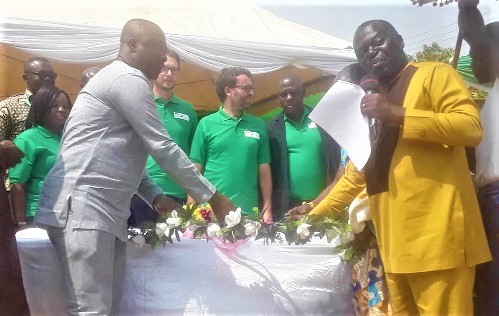
Forest Landscape Restoration project for Kintampo
The Deputy Minister of Lands and Natural Resources, Mr Benito Owusu-Bio, has launched a project which will ensure the reforestation of 300 hectares of degraded land for sustainable energy wood production and rehabilitation of 700 hectares of degraded natural forest in the Kintampo Municipality of the Bono East Region.
Dubbed: "Forest Landscape Restoration through a sustainable wood energy value chain," the €4.5 million German government-sponsored project also aims at introducing energy-efficient technologies for charcoal production and cooking stoves in the area.
The project is part of the German government's efforts to support partner countries such as Ghana for the implementation of global efforts to restore 150 million hectares of deforested and degraded land by 2020 and 350 million hectares by 2030.
The five direct beneficiary communities in the Kintampo area are Nante, Anyima, Amoma, Beposo and Babator where one of the major occupations of the residents is charcoal production.
Forest resources
Launching the project, Mr Owusu-Bio observed that the livelihoods of over 80 per cent of rural communities depended on forest resources for wood fuel, water resources, plant medicine, shelter and climate regulation.
"Every effort that seeks to address deforestation and add value to our forest resources is commendable,” he said, and welcomed the initiative by the German government through the GIZ to jointly implement the project in collaboration with the Ministry of Energy, Energy Commission, the Forestry Commission, the Environmental Protection Agency and some non-governmental organisations.
Mr Owusu-Bio observed that besides land clearing for agriculture and wildfires, charcoal production was another driver of deforestation, adding that the yearly demand of about 30 million tonnes of fuel wood was at the moment not sustainable for Ghana's natural forest.
He, therefore, called on communities involved in the implementation of the project to cooperate fully with the implementing agencies and partners to ensure a successful project.
Wood fuel
The Bono East Regional Minister, Mr Kofi Amoakohene, said forest degradation in the area had become a worrisome phenomenon and there was, therefore, an urgent need for interventions such as the Forest Landscape Restoration through a sustainable wood energy value chain to meet the challenge.
He explained that the charcoal trade in rural areas offered a much-needed source of income besides subsistence farming and therefore described the project as 'God sent' to improve the standard of living of the rural poor.
Mr Amoakohene stated that through the sustainable production and efficient use of energy wood, forest in the region would be preserved and restored, and thus contribute to the implementation of the government's flagship programmes such as Planting for Food and Jobs and Planting for Export and Rural Development.
Wood fuel regulations
For his part, the Chief Programme Officer of the Energy Commission, Mr Julius Nkansah-Nyarko, said the commission had started developing wood fuel regulations to formalise activities of woodfuel value chain and sanitise work in the charcoal industry.
The regulation, according to him, would ensure that firewood and charcoal were produced from sustainable sources and also by using improved production technologies.
Mr Nkansah-Nyarko said it was only through such approach that the negative impact that wood fuel production had on the country's forest resources could be reduced.
He stated that the commission had also developed standards for improved cookstoves, which aimed at ensuring that only cookstoves that met the minimum standards were available in the market.
Woodlots for SHSs
Mr Nkansah-Nyarko said the collaboration with the Forestry Commission and the Ghana Education Service for the implementation of the Woodlots for Schools Programme had ensured the establishment of woodlots on lands of some senior high schools (SHSs) for their own use.
"So far, over 100 SHSs have benefited from the programme and about 170 hectares of school lands have been cultivated with fast-growing tree species," he stated, adding that other schools would benefit from the programme this year.
The Deputy Head of Development Cooperation at the German Embassy in Ghana, Mr Robin Cordes, said currently Germany was supporting Ghana with 19 running transitional projects, with the Forest Landscape Restoration project being one of them.
He gave an assurance that the German government remained committed to cooperating with Ghana to achieve the Sustainable Development Goals.
The Municipal Chief Executive for Kintampo North, Mr Michael Sarkodie Baffo, gave an assurance that the assembly would integrate the project into its medium-term development plan to ensure its successful implementation.
Non-Governmental Organisations taking part in the implementation of the project are the International Union for Conservation of Nature, Netherlands, A Rocha Ghana and Tropenbos Ghana.
